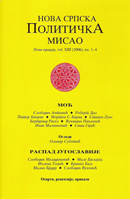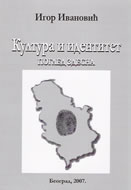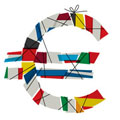| NSPM in English | |||
The Euro’s Lost Promise |
 |
 |
 |
| петак, 21. мај 2010. | |
|
(The New York Times, May 17, 2010)
The dream of monetary union across Europe has turned into a nightmare. Led by France and Germany, European countries have decided to spend colossal sums of taxpayers’ money they cannot afford to heal mounting internal disparities they cannot conceal to shore up an edifice many believe cannot stand. On Monday, that skepticism briefly pulled the value of the euro down to a four-year low against the dollar. A little over a week ago, European Union leaders approved a rescue package worth 750 billion euros (nearly $1 trillion) for weaker members like Greece, Portugal and Spain, backed by the International Monetary Fund and the American government. The present crisis extends well beyond its immediate causes: bad decisions in Athens, lack of European leadership and a poor economy. These are but the latest twists in a drama that began more than two decades ago. The underlying story of how 16 diverse European currencies were fused into the euro combines the contorted fortunes of two powerful German politicians who sought to tame Europe’s past and shape its future, along with a French president who wished to fasten economic shackles around the might of a reunified Germany. Ultimately, too, it is the story of how the Old Continent struggled to break free from the uncertain political and economic embrace of the United States. The pivotal moment in the formation of Europe’s monetary union came in December 1991 at a meeting in Maastricht in the southern Netherlands. Two years after the fall of the Berlin Wall, European leaders set a political path toward a Europe-wide currency — a holy grail that had been pursued since the Roman Empire. The new money would complete the European program of liberalized cross-border trade, promote the old dream of political unity, rival the dollar as an international reserve currency and — the most complicated objective — prevent an enlarged Germany’s domination of Europe by bringing its currency under European control. The mighty Deutsche mark needed to be cast into the furnace of European unity and forged into the euro. In the vanguard of the effort was none other than Chancellor Helmut Kohl, the man who had driven German reunification with miraculous speed. He knew he had to enshrine the larger Germany in a new European order to ease its neighbors’ fears. The euro would be the monetary equivalent of the ugly yet necessary military compact between NATO and the Warsaw Pact that supervised East and West Germany after World War II. To his credit, just before the Maastricht meeting, Chancellor Kohl noted that a monetary union without a corresponding political union would be “a castle in the air.” His remark echoed the concerns of the Bundesbank, his country’s statutorily independent central bank, that unless it involved greater political and economic anti-inflationary discipline and solidarity among weaker and stronger states, a monetary union would be doomed. Of course, the Bundesbank was also reluctant to cede its mastery of European monetary affairs to a new European Central Bank. And ordinary Germans were not eager to give up the mark, the guarantor of their prosperity. Yet Mr. Kohl fought for the monetary union, and the euro started on schedule, three months after he was voted out of office. (Eleven countries adopted the currency on Jan. 1, 1999; five more, including Greece, joined later.) Mr. Kohl’s partner in redrawing the contours of Europe was President François Mitterrand of France, who provided Mr. Kohl with the political incentive to create the monetary union, arguing that unified Germany had to participate in deeper European integration. Mr. Kohl agreed, but egged on by the Bundesbank applied conditions that to this day remain deeply irksome to France — principally that the new currency had to be run by a European Central Bank that would be at least as independent as the Bundesbank. The deeply held French view was that the state, not unelected central bankers, should have ultimate power over a nation’s money. Shortly before he died in 1996, Mitterrand told a confidant that his agreeing to the independence of the European Central Bank had been a terrible error. The third principal character in the story of the euro is Wolfgang Schäuble, Germany’s 67-year-old finance minister — a courageous, quick-thinking man suspended between the past and the present, between hope and tragedy. A paraplegic since being shot by a deranged assailant at an election rally in 1990, Mr. Schäuble served as Mr. Kohl’s Chancellery minister, applying connivance and calculation in dealings with East Germany and, later, as interior minister, deftly negotiating the 1990 reunification treaty. It was Mr. Schäuble who, with forbearance and persistence, played a central part in carrying out Mr. Kohl’s wish that the new Germany be integrated into a new Europe by the binding power of a common money. Mr. Schäuble is now the key member of Chancellor Angela Merkel’s coalition government, and the euro imbroglio presents him with his most exacting test. Yet during recent months of mounting tension caused by the debts of the southern members of the euro zone, he has been confined to a hospital bed for weeks on end. (He made it to Brussels earlier this month for a vital finance ministers’ meeting, but was rushed to the hospital there after suffering an allergic reaction to medication.) The ministers’ decision to offer nearly $1 trillion in aid and guarantees, with taxpayers from Germany bearing the largest share, was made without him. The huge amount of money aside, the significance of the rescue package was that, for the first time, power over the European Central Bank started to move to the politicians. President Nicolas Sarkozy of France, a longtime critic of the bank’s sway, joined forces with another Frenchman, Dominique Strauss-Kahn, managing director of the International Monetary Fund, to impose political supremacy over the euro zone. Decisive backing came from President Obama, who on the eve of the Brussels meeting telephoned Mrs. Merkel to warn her that Europe’s failure to act could set off another worldwide credit crunch. His intervention was incongruous in the extreme: an American president urging the German chancellor to shore up a currency union that was meant to bolster Europe’s financial independence from the United States. But this is not the only way in which the euro has defied expectations. Germany has long warned that southern euro states, no longer able to improve their competitiveness by devaluing their own currencies, could run into severe financial trouble. The red ink from their increasing trade deficits has been flowing for more than a decade. These countries have borrowed far too much for too long at too cheap interest rates. The current account deficits for Greece and Portugal average an unsustainable 10 percent of gross domestic product. Yet even as it predicted the trouble, Germany failed to anticipate that the countries running a trade surplus would inevitably need to finance the southern states’ shortfalls. The five most heavily indebted euro members owe German banks an estimated 700 billion euros (nearly $900 billion), and these German surpluses, once regarded abroad as a symbol of great strength, have emerged as a dangerous source of vulnerability. Most sickeningly for the Germans, the indebted nations are likely to say that their debts need to be reduced or restructured in the name of European solidarity. A German revolt against the attenuated independence of the European Central Bank appears likely, and could jeopardize parliamentary approval for the rescue package. The Germans feel mistreated by a monetary system that makes them pay for others’ largely self-inflicted misfortunes. And the trouble is far from over. The austerity programs for errant southern states ordained by European governments and the International Monetary Fund are likely to lead to severe unemployment and civil unrest. Some southern euro members may choose to return to their former currencies — or they may be asked to do so by other states. An overarching structure for political control over the euro is now being erected. But it is likely to be resisted by Germany, the main paymaster, which rejects any idea that German strength is a root cause of recent disequilibrium. Not for the first time in European history, differing perceptions of German power contain the seeds of much potential unrest. Monetary union was once the bright hope for laying to rest Germany’s demonic ability to unhinge Europe. Now it appears to be doing just the opposite. David Marsh, the chairman of an international consulting company, is the author of “The Euro: The Politics of the New Global Currency.” http://www.nytimes.com/2010/05/18/opinion/18marsh.html?pagewanted=2&hp |
Од истог аутора
Остали чланци у рубрици
- Playing With Fire in Ukraine
- Kosovo as a res extra commercium and the alchemy of colonization
- The Balkans XX years after NATO aggression: the case of the Republic of Srpska – past, present and future
- Из архиве - Remarks Before the Foreign Affairs Committee of the European Parliament
- Dysfunction in the Balkans - Can the Post-Yugoslav Settlement Survive?
- Serbia’s latest would-be savior is a modernizer, a strongman - or both
- Why the Ukraine Crisis Is the West’s Fault
- The Ghosts of World War I Circle over Ukraine
- Nato's action plan in Ukraine is right out of Dr Strangelove
- Why Yanukovych Said No to Europe

.jpg)








 Singapore
Singapore









